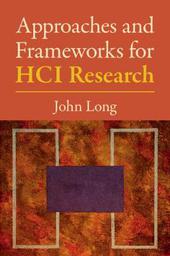
|
Approaches and Frameworks for HCI Research
Paperback / softback
Main Details
| Title |
Approaches and Frameworks for HCI Research
|
| Authors and Contributors |
By (author) John Long
|
| Physical Properties |
| Format:Paperback / softback | | Pages:294 | | Dimensions(mm): Height 227,Width 151 |
|
| Category/Genre | Ethical and social aspects of computing
Human-computer interaction |
|---|
| ISBN/Barcode |
9781108719070
|
| Classifications | Dewey:004.019 |
|---|
| Audience | | Professional & Vocational | |
|---|
| Illustrations |
Worked examples or Exercises
|
|
Publishing Details |
| Publisher |
Cambridge University Press
|
| Imprint |
Cambridge University Press
|
| Publication Date |
4 March 2021 |
| Publication Country |
United Kingdom
|
Description
This research textbook, designed for young Human-Computer Interaction (HCI) researchers beginning their careers, surveys the research models and methods in use today and offers a general framework to bring together the disparate concepts. HCI spans many disciplines and professions, including information science, applied psychology, computer science, informatics, software engineering and social science making it difficult for newcomers to get a good overview of the field and the available approaches. The book's rigorous 'approach-and-framework' response is to the challenge of retaining growth and diversification in HCI research by building up a general framework from approaches for Innovation, Art, Craft, Applied, Science and Engineering. This general framework is compared with other HCI frameworks and theories for completeness and coherence, all within a historical perspective of dissemination success. Readers can use this as a model to design and assess their own research frameworks and theories against those reported in the literature.
Author Biography
John Long is Emeritus Professor of Cognitive Engineering at University College London, where he was previously Professor of Cognitive Ergonomics and Director of the Ergonomics and HCI Unit. He has served as manager at Shell Oil International in Africa and Vietnam and as senior scientist at the Medical Research Council Applied Psychology Unit (MRC/APU), Cambridge. His research includes three coauthored books, more than 200 publications, and numerous presentations, grants and consultancies. He has received the Ergonomics Society (ES) Sir Frederick Bartlett medal, the International Ergonomics Association (IEA) Outstanding Educator's Award, and recently received the Athena Swan Award, being identified as a hero of Computer Science by the University of York. An avid cyclist, he has completed the Tour de France, Giro d'Italia and other major cycling tour routes elsewhere in Europe, Australia and Asia. He is also an expressive abstractionist painter. His 'Framed Approaches' from 1989 serves as the cover for this book. He is an unreconstructed existentialist.
Reviews'In a dynamic field such as HCI/user experience studies, there is seldom time to stop and think about the wider research enterprise. John Long's book will be an invaluable resource and stimulus to encourage researchers to think more deeply about what they are doing and how they are doing it.' Philip Barnard, Honorary Member, MRC Cognition and Brain Sciences Unit, Cambridge University 'Written by one of the founders of British HCI, this book is a call to action for a more rigorous, unified and cumulative discipline. In doing so, John Long equips the next generation of HCI researchers with the conceptual tools they will need to ensure the future of the field is in good hands.' Abigail Sellen, Microsoft Research 'This insightful book presents a General Framework to discuss and assess specific HCI research frameworks. This unavoidable debate is necessary to enable the HCI research community to progress and develop into a mature discipline. This fundamental book is written in a very concise and fair manner. I strongly recommend reading this book and learn from one of the best.' Matthias Rauterberg, Eindhoven University of Technology
|